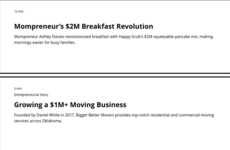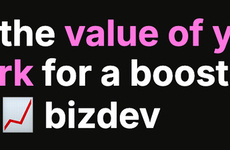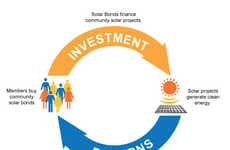
Tiana Reid — December 15, 2011 — Social Good
References: ankurcapital
Rema Subramanian and Ritu Verma are Ankur Capital. Rema Subramanian has 30 years of experience working in India through various scaling operations, as well as bringing her breadth of knowledge to advising social entrepreneurs. Rita Vermu has also worked in India and South East Asia by advising venture capital funds and emerging social entrepreneurs on business development, finance, strategy and operations.
Subramanian's strength of working cross-sectorally and Verma's focus on building sustainable business models come together to create Ankur Capital, which prides itself on not being a traditional business incubator, but a seed capital initiative "laying foundations for social businesses."
Four Questions with Rema Subramanian and Ritu Verma
1. How did the idea for the business model come about?
Insights after working with social entrepreneurs in the last two years, led us (Ritu and Rema) to start Ankur Capital. While non profits, small and big, have access to grant capital, small "for-profit" social business, find access to capital and management skill sets very hard to come by. It is an anomaly, organizations trying to create self-sustaining models find it harder to survive than the ones running on grants. This lead us to start Ankur Capital.
Getting access to the right skill sets apart from money is very critical in sustaining and scaling up. On one hand, there are incubators who provide initial support for ideas, impact investors or VCs, like to come in at early stage, when the organization is of a particular size and scale. There is a gap at the seed stage, where the impact investors find it's not financially viable to provide intensive support for minuscule amounts of capital. It's at the seed stage that many social entrepreneurs stagnate.
We looked at the old style of venture capitalists. Venture capitalists used to be known for raising moderate sized funds and assisted in building the start-ups they invested in. They would assist in not only hiring the management team, but would take an active role in the company. Ankur Capital intends providing small sums of seed money (USD 50K to USD 100K) and hands-on assistance to get the companies to the next level of growth.
2. How did you decide to join this sector?
Ritu: I had always been involved and interested in bringing new ideas to realization. I had done it in large multinational companies for low-income communities and finally through working alongside early stage venture capitalists. Realizing that I wanted to marry my interest in supporting new ideas and my experience in working with low-income communities to create a change in India led me to impact investing.
Rema: After three decades of building and scaling companies across various sectors, I decided to move to the social space. Realizing the lack of management experience in the social sector, I decided to do bring my corporate expertise to this sector. I am associated with Dasra as a mentor for social entrepreneurs.
Both of us used to be associated with Dasra and worked across various not for profits and for profit social entrepreneurs as mentors. We found many social entrepreneurs have the strong urge to create sustainable enterprises, but lack the management skills or access to small amounts of capital. Instead of being on the periphery as mentors, we decided to get our hands dirty and address the gap.
3. How do you get your inspiration?
Muhammad Yunus and Vineet Rai were our inspiration.
4. How do you reset yourself to be creative? Do you have any rituals?
We love travel and crafts! Each day brings in new excitement!
Subramanian's strength of working cross-sectorally and Verma's focus on building sustainable business models come together to create Ankur Capital, which prides itself on not being a traditional business incubator, but a seed capital initiative "laying foundations for social businesses."
Four Questions with Rema Subramanian and Ritu Verma
1. How did the idea for the business model come about?
Insights after working with social entrepreneurs in the last two years, led us (Ritu and Rema) to start Ankur Capital. While non profits, small and big, have access to grant capital, small "for-profit" social business, find access to capital and management skill sets very hard to come by. It is an anomaly, organizations trying to create self-sustaining models find it harder to survive than the ones running on grants. This lead us to start Ankur Capital.
Getting access to the right skill sets apart from money is very critical in sustaining and scaling up. On one hand, there are incubators who provide initial support for ideas, impact investors or VCs, like to come in at early stage, when the organization is of a particular size and scale. There is a gap at the seed stage, where the impact investors find it's not financially viable to provide intensive support for minuscule amounts of capital. It's at the seed stage that many social entrepreneurs stagnate.
We looked at the old style of venture capitalists. Venture capitalists used to be known for raising moderate sized funds and assisted in building the start-ups they invested in. They would assist in not only hiring the management team, but would take an active role in the company. Ankur Capital intends providing small sums of seed money (USD 50K to USD 100K) and hands-on assistance to get the companies to the next level of growth.
2. How did you decide to join this sector?
Ritu: I had always been involved and interested in bringing new ideas to realization. I had done it in large multinational companies for low-income communities and finally through working alongside early stage venture capitalists. Realizing that I wanted to marry my interest in supporting new ideas and my experience in working with low-income communities to create a change in India led me to impact investing.
Rema: After three decades of building and scaling companies across various sectors, I decided to move to the social space. Realizing the lack of management experience in the social sector, I decided to do bring my corporate expertise to this sector. I am associated with Dasra as a mentor for social entrepreneurs.
Both of us used to be associated with Dasra and worked across various not for profits and for profit social entrepreneurs as mentors. We found many social entrepreneurs have the strong urge to create sustainable enterprises, but lack the management skills or access to small amounts of capital. Instead of being on the periphery as mentors, we decided to get our hands dirty and address the gap.
3. How do you get your inspiration?
Muhammad Yunus and Vineet Rai were our inspiration.
4. How do you reset yourself to be creative? Do you have any rituals?
We love travel and crafts! Each day brings in new excitement!
Trend Themes
1. Seed Capital Initiative - Ankur Capital provides small sums of seed money and hands-on assistance to social businesses at the early stage for sustainable growth.
2. Impact Investing - Ankur Capital focuses on impact investing by supporting new ideas and low-income communities to create positive change in India.
3. Management Skills Gap - Ankur Capital addresses the lack of management skills and access to small amounts of capital for social entrepreneurs, offering mentorship and hands-on support.
Industry Implications
1. Venture Capital - The venture capital industry can explore disruptive innovation opportunities by providing seed capital and hands-on assistance to social businesses at the early stage.
2. Social Entrepreneurship - The social entrepreneurship industry can benefit from disruptive innovation opportunities by bridging the management skills gap and providing access to small amounts of capital for sustainable growth.
3. Impact Investment - The impact investment industry can seize disruptive innovation opportunities by supporting new ideas and low-income communities through financial backing and mentorship.
0.5
Score
Popularity
Activity
Freshness























